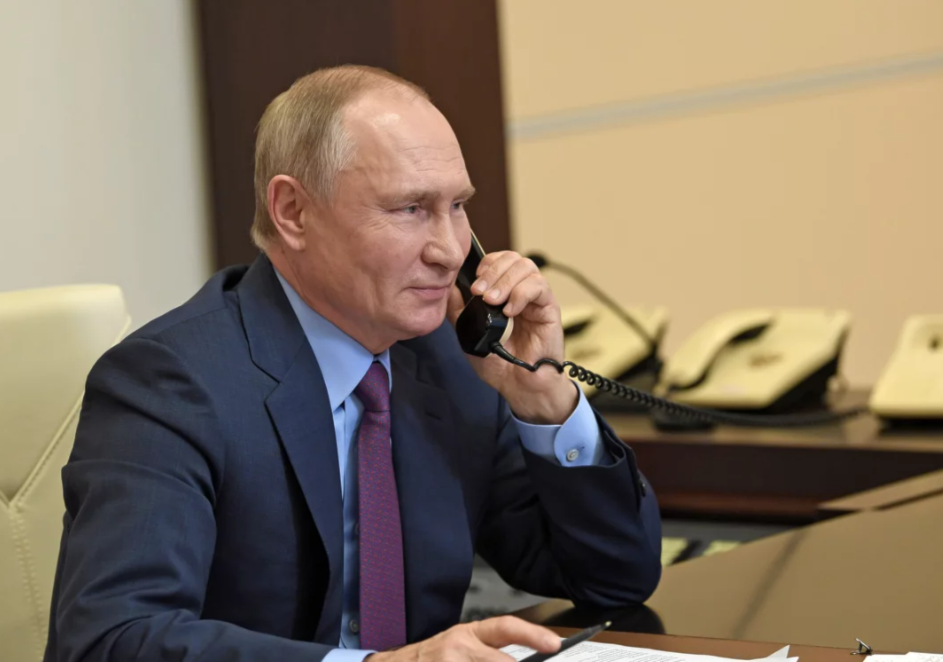Hotline between Russia and US not in use, Kremlin says
The Kremlin has confirmed that the hotline between the US and Russia, established in 1963 after the Cuban Missile Crisis for direct communication between the two presidents, is no longer operational.
-

Russian President Vladimir Putin speaks on the phone in December 2020. (TASS)
The hotline established to alleviate crises between the Kremlin and the White House is currently not in use, Kremlin spokesperson Dmitry Peskov told TASS.
“We have between the two presidents, Russia and the US, a special secure line for communication," Peskov said Wednesday, according to TASS, but when asked if it was still in use, Peskov replied, "No".
The hotline was established in 1963, a year after the Cuban Missile Crisis highlighted the significance of timely, direct contact between the Russian and American presidents.
According to the Kremlin, President Vladimir Putin's last phone call with his US counterpart Joe Biden occurred on February 12, 2022, just days before the war in Ukraine began.
In a similar context, the Kremlin denied Monday a report from US media claiming that Russian President Vladimir Putin and US President-elect Donald Trump had discussed the Ukraine conflict during a phone call last week.
The Washington Post reported on Sunday that Trump spoke with Putin on Thursday, urging him not to escalate the situation in Ukraine.
Kremlin Spokesperson Dmitry Peskov told journalists that The Washington Post report "is completely untrue. This is pure fiction, it's just false information," adding that "there was no conversation."
"This is the most obvious example of the quality of the information that is being published now, sometimes even in fairly reputable publications," Peskov said.
The Washington Post's report stated that during the call, Trump reminded Putin of the United States' significant military presence in Europe.
Putin approves Russia's updated framework on nuclear deterrence
The Kremlin statement comes a day after Putin revised Russia's nuclear doctrine, which categorizes aggression against Russia or its allies by a non-nuclear state supported by a nuclear one as a joint attack, adding that any aggression from a state within a military coalition is treated as an act of aggression by the entire coalition.
The timing of the issuance of the decree is critical as it came mere days after US President Joe Biden approved Ukraine's use of American long-range missiles against military targets within Russia, in a significant policy shift long sought by Kiev.
Putin has warned that such a decision would signify NATO's direct involvement in the conflict.
The decree, which took effect on November 19, emphasizes enhancing Russia's nuclear deterrence strategy to address potential threats and maintain national security.
This comes after US President Joe Biden approved for the first time Ukraine's request to use US long-range missiles for strikes on Russian territory, signaling a dramatic shift in US policy, The New York Times reported.
US embassy in Kiev closes fearing 'air attack'
The US Embassy in Kiev has been informed of a possible major airstrike on Wednesday and will be closed, according to a statement from the US Department of State Consular Affairs.
"Out of an abundance of caution, the embassy will be closed, and embassy employees are being instructed to shelter in place," the Department stated on the US Embassy's website in Kiev.
"The U.S. Embassy advises U.S. citizens to be ready to take immediate shelter if an air alert is issued."
This warning follows Ukraine's use of US ATACMS missiles to target Russian territory, a move made possible by the recent authorization from the outgoing administration of US President Joe Biden on the 1,000th day of the war.
Russia had previously warned the West that allowing Ukraine to launch US, British, and French missiles deep into Russian territory would lead Moscow to consider those NATO members as directly involved in the war in Ukraine.
In October, Russian President Vladimir Putin stated that Moscow would retaliate against Ukraine's use of US-made weapons to strike deep within Russian territory.

 4 Min Read
4 Min Read











